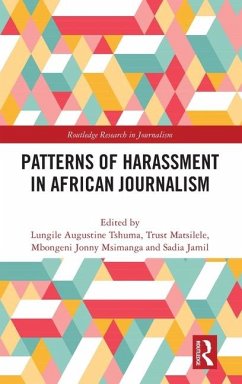Patterns of Harassment in African Journalism
Herausgeber: Tshuma, Lungile Augustine; Msimanga, Mbongeni Jonny; Matsilele, Trust
Patterns of Harassment in African Journalism
Herausgeber: Tshuma, Lungile Augustine; Msimanga, Mbongeni Jonny; Matsilele, Trust
- Gebundenes Buch
- Merkliste
- Auf die Merkliste
- Bewerten Bewerten
- Teilen
- Produkt teilen
- Produkterinnerung
- Produkterinnerung
This volume examines the trends and patterns of journalists' harassment in Africa, and assess the policy interventions and protection mechanisms that are put into place in the region.
Andere Kunden interessierten sich auch für
![The Dynamics of News The Dynamics of News]() Richard M. PerloffThe Dynamics of News196,99 €
Richard M. PerloffThe Dynamics of News196,99 €![Social Media Communication Social Media Communication]() Jeremy Harris LipschultzSocial Media Communication194,99 €
Jeremy Harris LipschultzSocial Media Communication194,99 €![Literary Journalism Goes Inside Prison Literary Journalism Goes Inside Prison]() Literary Journalism Goes Inside Prison195,99 €
Literary Journalism Goes Inside Prison195,99 €![Public Journalism 2.0 Public Journalism 2.0]() Public Journalism 2.0206,99 €
Public Journalism 2.0206,99 €![Decolonising Journalism Education in South Africa Decolonising Journalism Education in South Africa]() Decolonising Journalism Education in South Africa196,99 €
Decolonising Journalism Education in South Africa196,99 €![Journalism Online Journalism Online]() Mike WardJournalism Online67,99 €
Mike WardJournalism Online67,99 €![The Pursuit of Public Journalism The Pursuit of Public Journalism]() Tanni HaasThe Pursuit of Public Journalism206,99 €
Tanni HaasThe Pursuit of Public Journalism206,99 €-
-
-
This volume examines the trends and patterns of journalists' harassment in Africa, and assess the policy interventions and protection mechanisms that are put into place in the region.
Hinweis: Dieser Artikel kann nur an eine deutsche Lieferadresse ausgeliefert werden.
Hinweis: Dieser Artikel kann nur an eine deutsche Lieferadresse ausgeliefert werden.
Produktdetails
- Produktdetails
- Verlag: Routledge
- Seitenzahl: 272
- Erscheinungstermin: 14. Juni 2024
- Englisch
- Abmessung: 240mm x 161mm x 19mm
- Gewicht: 575g
- ISBN-13: 9781032697482
- ISBN-10: 1032697482
- Artikelnr.: 70372233
- Herstellerkennzeichnung
- Libri GmbH
- Europaallee 1
- 36244 Bad Hersfeld
- gpsr@libri.de
- Verlag: Routledge
- Seitenzahl: 272
- Erscheinungstermin: 14. Juni 2024
- Englisch
- Abmessung: 240mm x 161mm x 19mm
- Gewicht: 575g
- ISBN-13: 9781032697482
- ISBN-10: 1032697482
- Artikelnr.: 70372233
- Herstellerkennzeichnung
- Libri GmbH
- Europaallee 1
- 36244 Bad Hersfeld
- gpsr@libri.de
Lungile Augustine Tshuma is Researcher at the Centre for Communication and Culture, Universidade Catolica Portuguesa, Portugal. He holds a Ph.D. in journalism studies from the University of Johannesburg, South Africa. He has worked at the University of Johannesburg as a Senior Post-Doctoral Researcher. Lungile's research interests are in photography, memory and journalism. Trust Matsilele is Senior Lecturer in the College of English and Media, Birmingham City University, United Kingdom. He publishes in the areas of changing journalism ecologies, social media and protest cultures and the intersection of education and technology. Matsilele holds a Ph.D. in Communication Studies from the University of Johannesburg. Mbongeni Jonny Msimanga is Senior Post Doctoral Fellow at the Johannesburg Institute of Advanced Study (JIAS). South Africa. He completed his Ph.D. in 2022. Previously, Mbongeni was a recipient for the Canon Collins Sol Plaatje scholarship. Mbongeni's research interests are Journalism Practice, Digital Cultures and Social Media Activism, Cultural Studies. Sadia Jamil is Assistant Professor and Director of Research at the School of International Communications, the University of Nottingham, Ningbo, China. She is also the Director of Institute of Mobile Studies at UNNC. She earned a Ph.D. in Journalism (University of Queensland, Australia). She has taught courses at the Khalifa University of Science and Technology, Abu Dhabi and in the past, at the University of Queensland, Australia.
Chapter 1: 'Defence-less Defenders': Mapping Harassment in African
Journalism
Section 1: Harassment of Female Journalists
Chapter 2: "There Were no Repercussions, Nothing, Life Continued":
Experiences of Harassment by Female Journalists'
Chapter 3: Being a Woman-Journalist in a Polarised Context in Mozambique: A
Forgotten Issue? Chapter 4: Emergent Forms and Patterns of Online
Harassment of Women Journalists in African countries: A Scoping Review
Chapter 5: Gendered Threats and Attacks In and Outside the Newsroom:
Nigerian Female Journalists' Experiences with Harassment
Chapter 6: Digital Surveillance, Online and Offline Harassment and Feminist
Media Politics
Section 2: Online Harassment of Journalists and the Pitfalls for Democracy
Chapter 7: Independent Online Journalists' Harassment and the Emotional
Repercussions: A Case of Selected Zimbabwean Journalists
Chapter 8: Journalists' Repression, Harassment and Attacks in Eswatini and
Botswana
Chapter 9: Harassment and Threats Faced by Journalists in Kenya:
Implications for Press Freedom and Independent Reporting
Chapter 10: The Cost of Dissent in a Governance System Characterized by
'Political Marketplace': A Phenomenological Study of Independent
Journalists in Ethiopia
Chapter 11: Outsourcing Repression: Impunity and Harassment of Journalists
in Malawi
Section 3: Journalists Safety and Coping Mechanisms
Chapter 12: Coping into Self-Censorship: Exploring coping strategies of
journalists working in South Sudan
Chapter 13: Safety of journalists during elections coverage in Zimbabwe
Chapter 14: Time to Act: Measures of Curbing Harassment of Journalists in
African Newsrooms
Journalism
Section 1: Harassment of Female Journalists
Chapter 2: "There Were no Repercussions, Nothing, Life Continued":
Experiences of Harassment by Female Journalists'
Chapter 3: Being a Woman-Journalist in a Polarised Context in Mozambique: A
Forgotten Issue? Chapter 4: Emergent Forms and Patterns of Online
Harassment of Women Journalists in African countries: A Scoping Review
Chapter 5: Gendered Threats and Attacks In and Outside the Newsroom:
Nigerian Female Journalists' Experiences with Harassment
Chapter 6: Digital Surveillance, Online and Offline Harassment and Feminist
Media Politics
Section 2: Online Harassment of Journalists and the Pitfalls for Democracy
Chapter 7: Independent Online Journalists' Harassment and the Emotional
Repercussions: A Case of Selected Zimbabwean Journalists
Chapter 8: Journalists' Repression, Harassment and Attacks in Eswatini and
Botswana
Chapter 9: Harassment and Threats Faced by Journalists in Kenya:
Implications for Press Freedom and Independent Reporting
Chapter 10: The Cost of Dissent in a Governance System Characterized by
'Political Marketplace': A Phenomenological Study of Independent
Journalists in Ethiopia
Chapter 11: Outsourcing Repression: Impunity and Harassment of Journalists
in Malawi
Section 3: Journalists Safety and Coping Mechanisms
Chapter 12: Coping into Self-Censorship: Exploring coping strategies of
journalists working in South Sudan
Chapter 13: Safety of journalists during elections coverage in Zimbabwe
Chapter 14: Time to Act: Measures of Curbing Harassment of Journalists in
African Newsrooms
Chapter 1: 'Defence-less Defenders': Mapping Harassment in African
Journalism
Section 1: Harassment of Female Journalists
Chapter 2: "There Were no Repercussions, Nothing, Life Continued":
Experiences of Harassment by Female Journalists'
Chapter 3: Being a Woman-Journalist in a Polarised Context in Mozambique: A
Forgotten Issue? Chapter 4: Emergent Forms and Patterns of Online
Harassment of Women Journalists in African countries: A Scoping Review
Chapter 5: Gendered Threats and Attacks In and Outside the Newsroom:
Nigerian Female Journalists' Experiences with Harassment
Chapter 6: Digital Surveillance, Online and Offline Harassment and Feminist
Media Politics
Section 2: Online Harassment of Journalists and the Pitfalls for Democracy
Chapter 7: Independent Online Journalists' Harassment and the Emotional
Repercussions: A Case of Selected Zimbabwean Journalists
Chapter 8: Journalists' Repression, Harassment and Attacks in Eswatini and
Botswana
Chapter 9: Harassment and Threats Faced by Journalists in Kenya:
Implications for Press Freedom and Independent Reporting
Chapter 10: The Cost of Dissent in a Governance System Characterized by
'Political Marketplace': A Phenomenological Study of Independent
Journalists in Ethiopia
Chapter 11: Outsourcing Repression: Impunity and Harassment of Journalists
in Malawi
Section 3: Journalists Safety and Coping Mechanisms
Chapter 12: Coping into Self-Censorship: Exploring coping strategies of
journalists working in South Sudan
Chapter 13: Safety of journalists during elections coverage in Zimbabwe
Chapter 14: Time to Act: Measures of Curbing Harassment of Journalists in
African Newsrooms
Journalism
Section 1: Harassment of Female Journalists
Chapter 2: "There Were no Repercussions, Nothing, Life Continued":
Experiences of Harassment by Female Journalists'
Chapter 3: Being a Woman-Journalist in a Polarised Context in Mozambique: A
Forgotten Issue? Chapter 4: Emergent Forms and Patterns of Online
Harassment of Women Journalists in African countries: A Scoping Review
Chapter 5: Gendered Threats and Attacks In and Outside the Newsroom:
Nigerian Female Journalists' Experiences with Harassment
Chapter 6: Digital Surveillance, Online and Offline Harassment and Feminist
Media Politics
Section 2: Online Harassment of Journalists and the Pitfalls for Democracy
Chapter 7: Independent Online Journalists' Harassment and the Emotional
Repercussions: A Case of Selected Zimbabwean Journalists
Chapter 8: Journalists' Repression, Harassment and Attacks in Eswatini and
Botswana
Chapter 9: Harassment and Threats Faced by Journalists in Kenya:
Implications for Press Freedom and Independent Reporting
Chapter 10: The Cost of Dissent in a Governance System Characterized by
'Political Marketplace': A Phenomenological Study of Independent
Journalists in Ethiopia
Chapter 11: Outsourcing Repression: Impunity and Harassment of Journalists
in Malawi
Section 3: Journalists Safety and Coping Mechanisms
Chapter 12: Coping into Self-Censorship: Exploring coping strategies of
journalists working in South Sudan
Chapter 13: Safety of journalists during elections coverage in Zimbabwe
Chapter 14: Time to Act: Measures of Curbing Harassment of Journalists in
African Newsrooms








